Transcription
https://www.nytimes.com/2020/01/09/us/mississippi-prisons.html
‘A Blood Bath’: 5 Dead as Gang Violence Rocks Mississippi Prisons
Five inmates were slain last week, and two inmates escaped. The violence has illuminated an understaffed system troubled by gang warfare.
Images of clogged drains, mold, exposed wires, holes in cell walls, broken toilets and windows blocked by bird’s nests at the Mississippi State Penitentiary in Parchman fill last year’s health inspection report from the Mississippi State Department of Health.Credit...Mississippi State Department of Health
By Rick Rojas and Richard Fausset
Jan. 9, 2020
78
JACKSON, Miss. — Betty Turner dreaded what her son would face in the state penitentiary in Parchman, the Mississippi Delta prison that has, over the course of more than a century, earned a dark and near-mythic reputation for cruelty and institutional racism. Her fears were realized when he described meals of just a slice of bologna with a packet of mustard, sightings of rats and mold, and nights spent on a mat on a cold, damp floor.
But over the last week, such worries have come to feel almost trifling, as Mississippi’s state prisons have exploded with gang warfare, riots, disorder and killing. Five inmates have died, three of them slain at Parchman. Two inmates escaped. Videos and photos of fires and blood-smeared walls, shot by inmates on smuggled cellphones, have spread across social media.
Now Ms. Turner’s son, 27 and serving a 15-year sentence related to an armed robbery, is wondering whether he will survive.
“When my child tells me he’s afraid — and he’s not the type to be afraid,” said Ms. Turner, her voice trailing off. “That’s a problem.”
Department of Corrections officials responded to last week’s crisis with a systemwide lockdown affecting all of Mississippi’s roughly 19,000 inmates. The lockdown was lifted for some regional facilities Tuesday, and the two escaped inmates have been apprehended. But there remains a sense that Mississippi must now reckon with a disaster that has been a long time coming.
“You’ve heard the saying, pressure busts pipes,” said Benny Ivey, who spent more than a decade as an inmate in Mississippi prisons and now advocates on behalf of prisoners.
“This was gang violence — it’s the fact of the matter,” he added. “But also the fact of the matter, if you ain’t treated like animals, you won’t act like an animal. They’re people, man. They’re our loved ones. They are our brothers, our uncles, our daddies, our grandfathers.”
This week, Representative Bennie G. Thompson, Democrat of Mississippi, and a roster of state civil rights groups asked the Justice Department to open a civil rights investigation into the state’s prison system. In a 23-page letter, they described “extreme” staff vacancies despite the third-highest incarceration rate in the country.
The letter also described a long record of violence, escapes, uprisings, inadequate health care and institutions where criminal gangs are tolerated. At one prison, the letter noted, gang members who dominate the kitchen withhold food to punish disfavored prisoners, and control who gets a mattress or blanket.
“The Mississippi prison system is in a state of acute and undeniable crisis,” the letter states.
Rep. Thompson’s request for a civil rights probe
In a 23-page letter, Mr. Thompson and state civil rights groups described the Mississippi prison system as being in a “state of acute and undeniable crisis.”
Gangs are a fact of life in Mississippi prisons, with many members belonging to one of two rival groups with roots in the streets of Chicago, the Vice Lords and the Gangster Disciples, said Jimmy Anthony, a retired criminal investigator and instructor at the state police academy who serves as a spokesman for the Mississippi Association of Gang Investigators.
Mr. Anthony said that sources inside the system have told him that some of the current trouble was sparked by tensions between these two groups, which maintain ties to Chicago leaders and Mississippi street gangs, and are heavily involved in the distribution of illegal drugs in the state.
Ms. Turner said she thought that her son “may be” involved in a gang at Parchman.
“I mean you really don’t have a choice,” she said. “If you want protection or to be protected, sometimes it’s forced upon you.”
The recent burst of violence almost ensures that the longstanding problems in the state’s prison system will take center stage as the Republican-dominated Legislature begins a new session this month and as the state’s governor-elect, Tate Reeves, prepares for his Jan. 14 inauguration.
It potentially also raises new questions about how far red-state conservatives, who have been open to a changing approach to criminal justice in recent years, are willing to go in embracing the concept without betraying their law-and-order principles.
Mr. Reeves, a Republican and the current lieutenant governor, was elected in November as a self-described “fiscal watchdog” who promised to continue the tradition established by his predecessors of providing tax relief to stimulate business investment. State pundits in recent months have largely focused on how Mr. Reeves might hew to conservative orthodoxy while raising revenues for badly neglected roads and improving health care in one of the nation’s poorest states.
But now he must also face head-on an issue that is both staggeringly complex and rooted in the most shameful elements of Mississippi’s past: The Parchman prison, in particular, was once a vast and hugely profitable cotton operation expressly designed to deal with what an early-20th-century white governor, James K. Vardaman, called the “criminal Negroes” who threatened “the white man’s home.”
Among the first tasks facing Mr. Reeves, who is white, will be finding a new commissioner of the corrections department; the current department head, Pelicia E. Hall, announced last month that she would be leaving her job for a role in the private sector.
Representatives for Mr. Reeves’s transition office declined to comment on Wednesday, but Mr. Reeves has said in recent days that he had been briefed by prison officials and called restoring order the highest priority. “Then, we need answers and justice,” he said in a post on Twitter, adding, “There is much work to be done in our correctional system.”
Civil rights advocates say Mississippi’s current penal system has been stressed by tough-on-crime measures, including “three strikes” laws that sentenced repeat offenders to life without parole and were popular during the “war on drugs” era of the 1980s and 1990s.
More recently, Republican lawmakers in Mississippi, as in other conservative states, have come to see these policies as straining families and burdening state budgets. According to the Pew Charitable Trusts, the prison population in Mississippi grew by 300 percent between 1983 and 2013, to more than 22,000 inmates.
“It’s not a gang war — it’s a systemic war,” said Sharon Brown, an activist who protested prison conditions outside of the State Capitol on Tuesday.Credit...Rogelio V. Solis/Associated Press
In 2014, the Legislature passed ambitious, bipartisan and widely lauded changes to sentencing and corrections laws. Just over a year ago, President Trump, who is seeking to reduce the federal prison population, cited Mississippi as a model and praised the “fantastic job” state officials had done.
The 2014 changes and others that followed have helped bring Mississippi’s inmate population down to its current level of about 19,000 inmates, said Cliff Johnson, director of the MacArthur Justice Center at the University of Mississippi School of Law. But Mr. Johnson, a former federal prosecutor and a signer of this week’s letter to the Justice Department, said that much more needed to be done.
The state could start, Mr. Johnson said, by immediately releasing roughly 2,000 state inmates who are doing time only for drug possession offenses, following the lead of Oklahoma, which released hundreds of nonviolent offenders in November. The state could also expand access to parole and scale back habitual offender laws, he said.
Mr. Johnson was cautiously optimistic of bipartisan support, given the drama and fear that has engulfed the state. “My sense is that recent events in our prisons have focused legislators on corrections issues more than at any time in my memory,” he said.
State Senator Brice Wiggins, a Republican, agreed that there would likely be broad support within the Legislature to expand the push to find alternatives to incarceration, as well as boost pay and training for corrections officers.
But he also said lawmakers should tackle gang violence as a threat inside and outside of prisons. “It is an area that is not Republican or Democrat,” Mr. Wiggins said of the recent unrest. “Everyone, from what I can tell, believes that we need to look at this issue and address it so that it doesn’t continue to happen.”
This week, the Mississippi Center for Public Policy, a conservative think tank in Jackson, published an analysis suggesting that the state could fund cheaper alternatives to incarceration like intervention courts, community diversions and drug treatment.
“We need to continue to reform our criminal justice system, and reprioritize and refocus its purpose,” Brett Kittredge, an executive with the policy center, wrote in its analysis. “Simply giving a raise of a few thousand dollars to prison guards won’t do that.”
According to the letter to the Justice Department, the entry-level salary for a Mississippi corrections officer is $24,900, the lowest of any state. Critics say that job seekers in a good economy are, predictably, gravitating toward safer and less-taxing jobs.
In urging lawmakers to boost funding for her agency, Ms. Hall, the outgoing corrections commissioner, told them last year that there were more than 670 vacancies for staff security positions.
“We are operating in a pressure cooker-type situation right now,” she said.
Ms. Hall was not alone in sounding the alarm.
The Mississippi Center for Investigative Reporting, a nonprofit newsroom founded in 2018 by the veteran civil rights reporter Jerry Mitchell, worked with ProPublica to document many of the current problems in a series titled “Locked Down.” And The Marshall Project, another nonprofit news outlet, published a report in June that showed that Wilkinson County Correctional Facility, a privately run, 950-bed prison in South Mississippi, had turned to gang leaders to help “keep the peace” in a violence-plagued environment.
The state’s outgoing Republican governor, Phil Bryant, a former Hinds County deputy sheriff, said gangs were driving violence inside of the prisons as well as outside, on the streets of Jackson, the state capital, and elsewhere. He acknowledged, too, the dire circumstances that made it difficult to attract corrections officers, but he assigned blame to the inmates for the disorder.
“The inmates are the ones that take each other’s lives,” he recently told reporters. “The inmates are the ones who fashion weapons out of metal. The inmates are the ones who do the damage to the very rooms they are living in there. You look to the inmates.”
He also said that the accounts from inside the system, recorded by inmates and shared on social media, had spread misinformation and spurred further mayhem. “You’re making them stars, and they’re convicts,” he said.
Still, critics of the state’s criminal justice and prison system say the gangs are the symptom of a larger problem.
“It’s not a gang war — it’s a systemic war,” said Sharon Brown, an activist who regularly hears from people she knows who are serving time in the state prison system. “It took a blood bath that continues right now for everyone to start paying attention.”
Rick Rojas reported from Jackson, and Richard Fausset from Atlanta.
Other posts by this author
|
2023 may 31

|
2023 mar 20

|
2022 aug 23

|
2022 aug 23

|
2022 aug 23

|
2022 aug 23

|
More... |

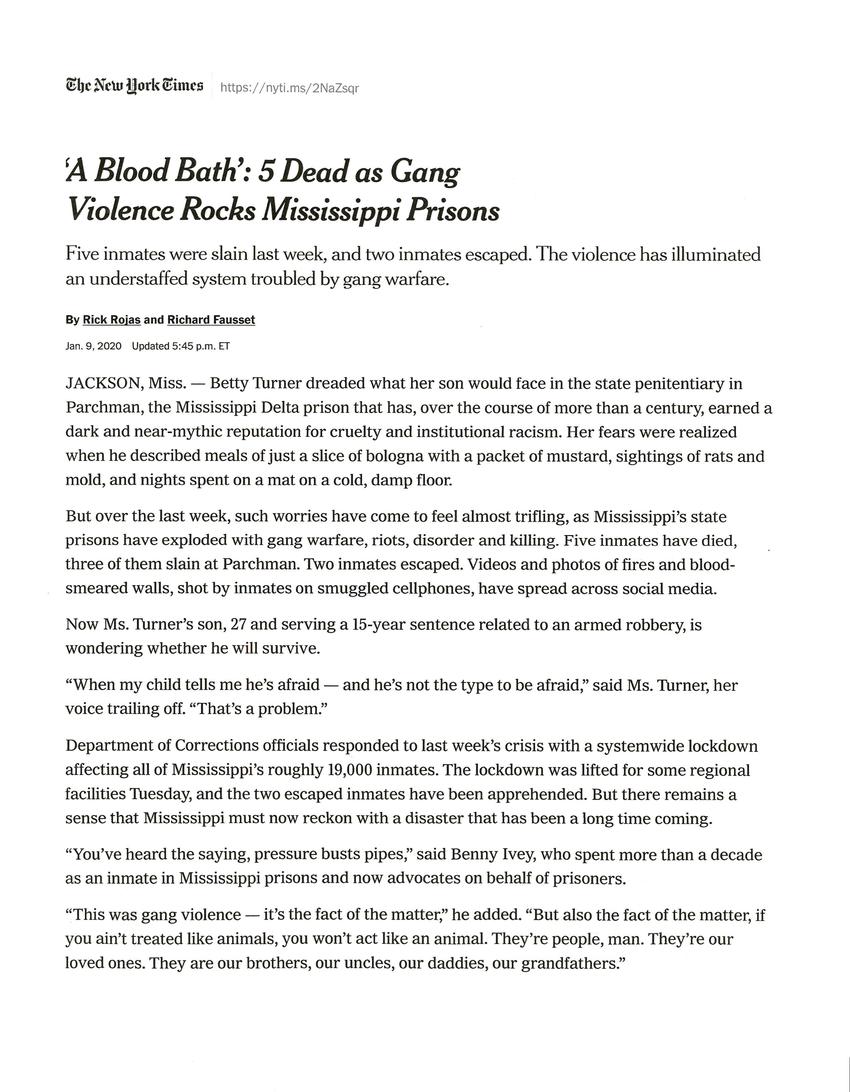
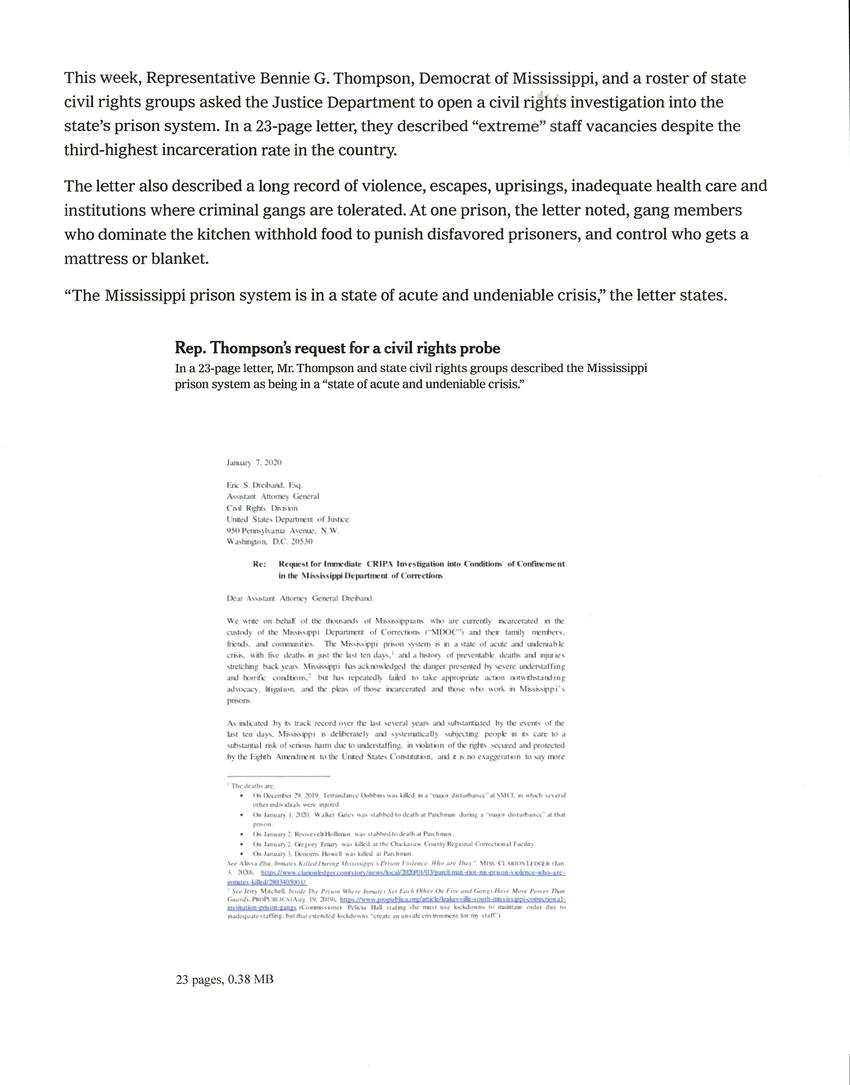
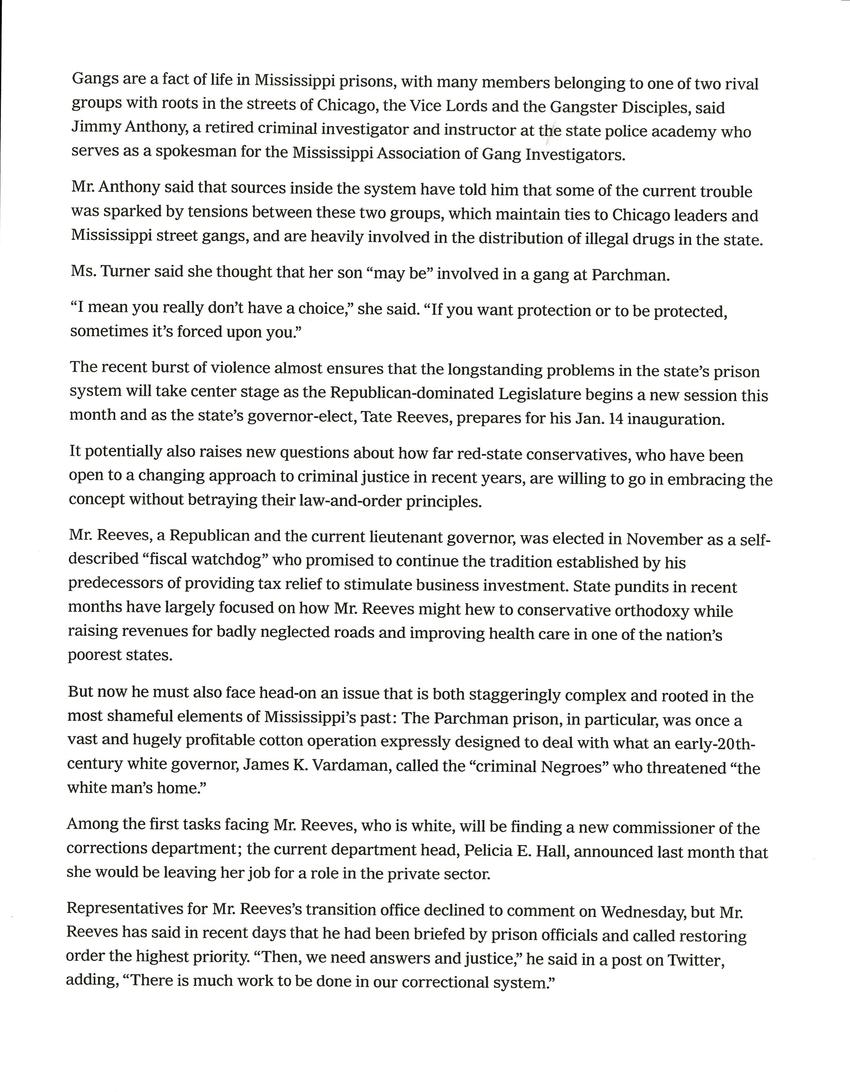
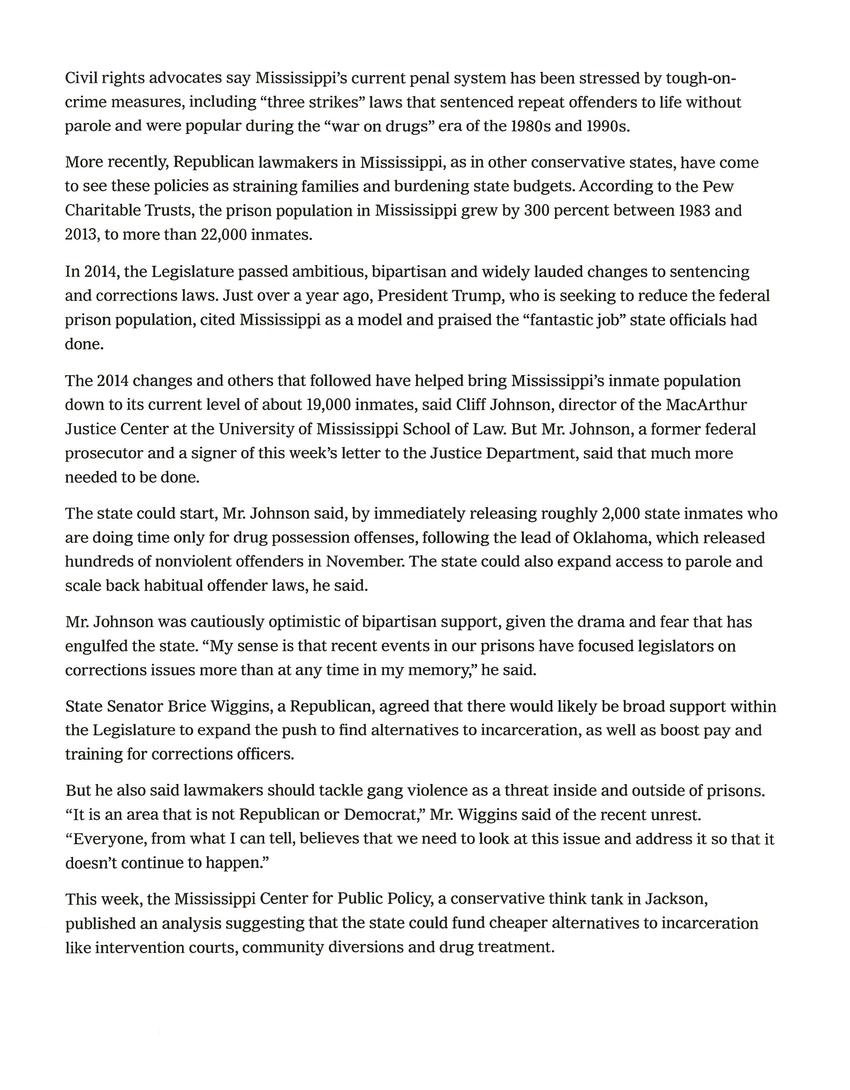
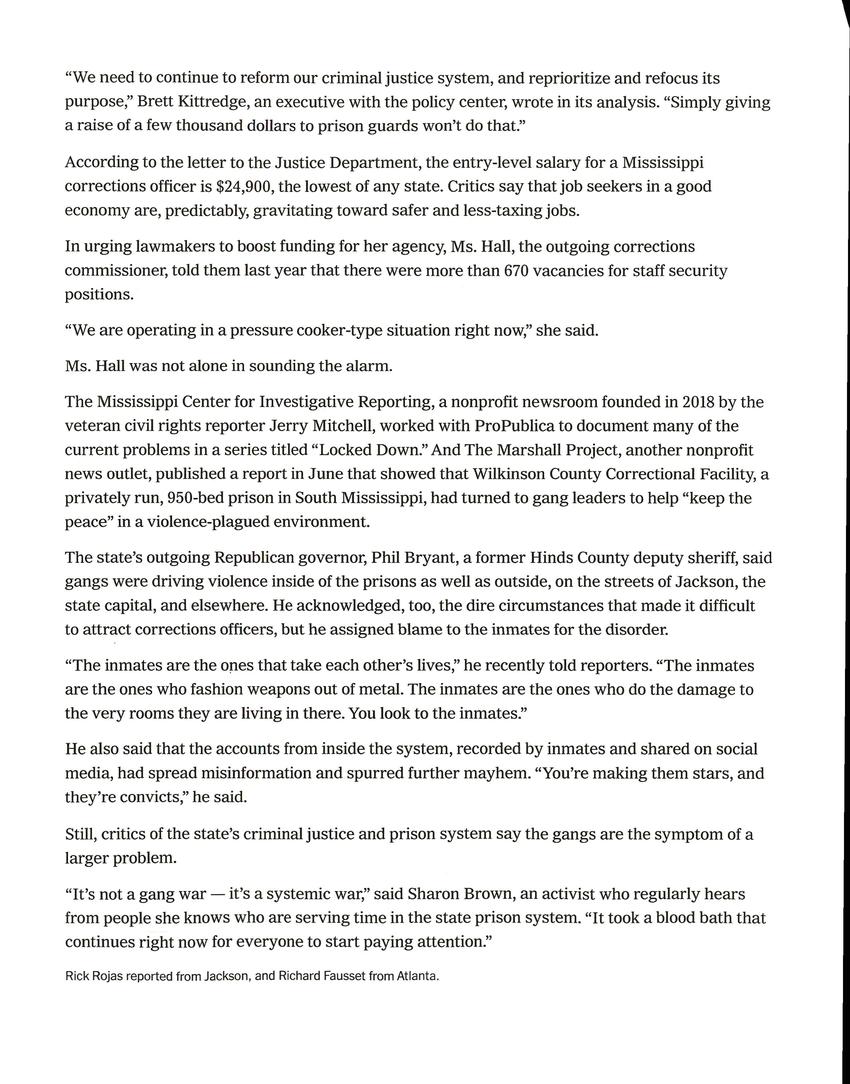

Replies